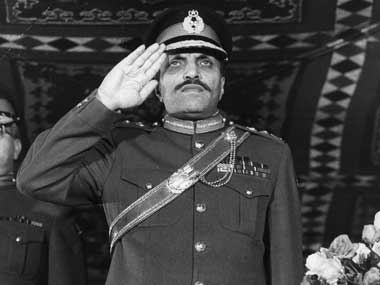This past week marked two anniversaries in Pakistan, that of the nation’s birth and that of president Zia ul-Haq’s death. Zia is a strange figure. Reading about him in Pakistan’s English press one would think that he is hated by most Pakistanis. Daily Times in its editorial of 15 August said: “So-called Islamisation, starting from Zia’s era, has reduced the state and society to being entrapped by religious intolerance and lack of direction.” This is typical and Zia tends to pick up the blame for conditions in Pakistan’s society. But the fact is that his Hudood laws, which Islamised Pakistan remain on the books. Pakistan studies, which teach Pakistani school students to hate India, and Islamiat, which trains them to be more like Arabs, also remain in textbooks. Why? The answer is that Zia ul-Haq gave Pakistan what it wanted. Liaqat Ali Khan and the Muslim League gifted Pakistan the Objectives Resolution six months after Jinnah’s death, committing to align law with shariah. General Ayub Khan wrote the law restricting non-Muslims from becoming President. Prime minister Zulfikar Ali Bhutto stopped non-Muslims from becoming prime minister. He legislated the law apostatising Ahmadis, and the law was both democratic and unanimous. All elected and unelected Pakistani leaders have generally moved in the direction that Zia also did. But he did it less hypocritically than others. [caption id=“attachment_422762” align=“alignleft” width=“380”]  All elected and unelected Pakistani leaders have generally moved in the direction that Zia also did. But he did it less hypocritically than others. Getty Images[/caption] After his death, a hagiography (“Shaheed-ul-Islam Muhammad Zia-ul-Haq”) was published by Zia’s friends. The contribution from Nawaz Sharif praises Zia for being like Allama Iqbal. Zia believed in the reconstruction of religious thought, writes Sharif, though I think that’s doubtful. Iqbal wanted to modernise Islam by putting its medieval punishments in abeyance. Zia actually introduced them into the law. He began flogging drunks publicly and wrote the law that adulterers had to be stoned and thieves amputated. In the same book, journalist Zahid Malik writes that though seen as a nuclear hawk, Zia was willing to sign the non-proliferation treaty. His conditions were: 1) South Asia was declared a nuclear-free zone, 2) India and Pakistan sign simultaneously, 3) The two also sign a bilateral non-proliferation treaty, 4) The two allow international inspectors to check each facility and 5) The two renounce the use of nuclear weapons. I think this was a wise proposal, even if Zia was saying this to escape the United States’ pressure on signing the NPT. If India had accepted, we would have a less unstable subcontinent today. The other thing that occurs to me is that the problems India faced in Kashmir with the rise of the mujahideen came in the first reign of Benazir. Zia did not indulge in that sort of mischief and Indians exaggerate the support of Pakistan to the Sikh separatist movement of the 1980s. Zia was friendly towards India and surprised the world by announcing he was coming to Indira Gandhi’s funeral. He is the man who invented cricket diplomacy, springing it on Rajiv Gandhi. Zia may be disliked by Pakistan’s English editorial writers but 10 lakh people came to Zia’s funeral wrote his deputy, Gen KM Arif, showing his popularity. Zia reminds me of Aurangzeb. Zia had his rival Bhutto executed judicially for the murder of a complainant’s father, exactly like Aurangzeb did away with Murad Baksh. Both men had a false modesty, made much of being reluctant to wield power (see Aurangzeb’s letters to Shah Jahan), and had a general dislike of Shias. Newsweek in its obituary said Zia was “incorruptible”. Another similarity. His court chronicler Saqi Must’ad Khan said Aurangzeb’s bedtime reading was the fundamentalist medieval cleric Imam Ghazali. Zia read the works of the Jamaat-e-Islami’s founder Maudoodi and not much else. KM Arif says Zia “could not get down to reading bureaucratic situation reports and files”. The big similarity is of course the laws they introduced. Jaziya, the penalty for being born Hindu, went after Aurangzeb died because the Syed brothers of Barha were not bigots. The laws of Zia will remain longer. Fundamentalists have their softer side. Aurangzeb liked quality chinaware. He liked woodwind instruments played with the pakhavaj more than vocal music. But because the former was haram he gave up listening to all music entirely. Zia was fond of Bollywood movies and Hindi music, and played squash, tennis and billiards. The words “silent majority” are often used when Pakistanis writing in English refer to Zia’s laws or their fallout, such as the shooting of governor Salmaan Taseer for defending a Christian woman against the charge of blasphemy. The truth is that these laws that remain on the book unchanged through dictatorial and democratic governments are there because they are popular. There is no silent majority in Pakistan, only a minority that doesn’t grasp reality. The Quaid-e-Azam Muhammad Ali Jinnah and Zia were two leaders who knew what the subcontinent’s Muslims wanted, and gave it to them.
This past week marked two anniversaries in Pakistan, that of the nation’s birth and that of president Zia ul-Haq’s death. Zia may be disliked by Pakistan’s English editorial writers but he was the leader that Pakistan wanted.
Advertisement
End of Article
Written by Aakar Patel
Aakar Patel is a writer and columnist. He is a former newspaper editor, having worked with the Bhaskar Group and Mid Day Multimedia Ltd. see more


)
)
)
)
)
)
)
)
)



